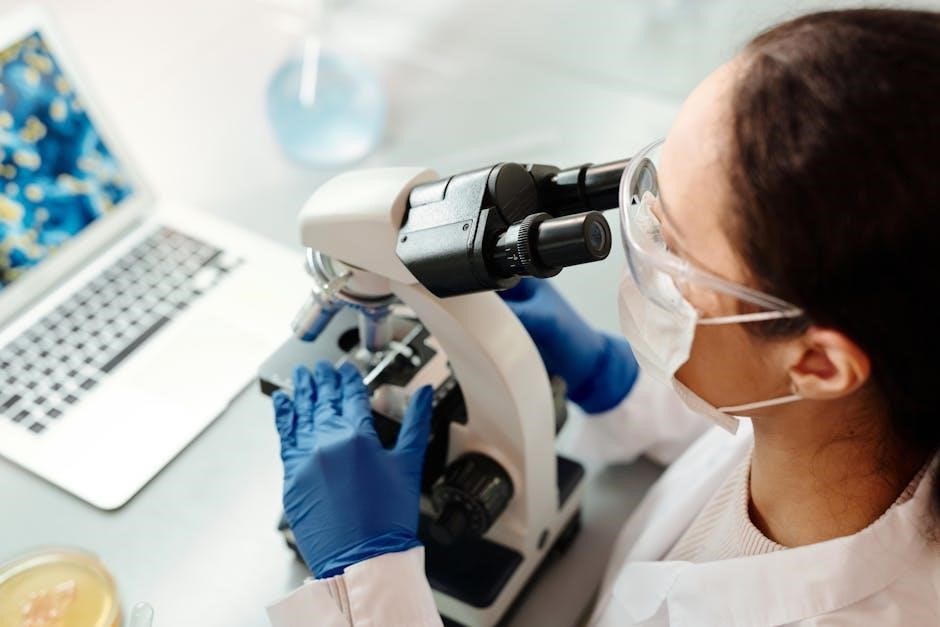The new biology challenges traditional views by shifting from machine metaphors to dynamic systems․ Philip Ball’s vision offers a fresh understanding of life’s processes and possibilities․

Redefining Life in the 21st Century
The 21st century has brought a revolutionary shift in how we understand life․ Moving beyond outdated machine metaphors, modern biology emphasizes life as a dynamic, interconnected process․ This perspective, as highlighted in Philip Ball’s work, reveals life as a complex web of interactions, where genes, environment, and energy continuously influence one another․ By embracing this holistic view, scientists are uncovering new possibilities for enhancing life and addressing its challenges․ This redefinition not only deepens our understanding of biology but also opens doors to innovative approaches in medicine, sustainability, and beyond․ Life is no longer seen as a static entity but as a constantly evolving, adaptive system․
The Shift from Machine Metaphors to Dynamic Systems
The shift from machine metaphors to dynamic systems revolutionizes our understanding of life․ Traditional views likened living organisms to machines, emphasizing predictable, mechanical functions․ However, this approach fails to capture life’s complexity and adaptability․ Dynamic systems biology reveals life as a network of interactions, where components continuously adapt and evolve․ This perspective, as explored in Philip Ball’s work, highlights the interconnectedness of biological processes, moving beyond rigid, reductionist models․ By embracing this holistic view, scientists gain deeper insights into how life sustains itself and responds to challenges․ This paradigm shift opens new avenues for understanding biological phenomena and addressing complex health and environmental issues․
The Core Concepts of Life
Life is a dynamic process, not a static entity, involving intricate interactions, energy exchange, and continuous adaptation, reflecting the essence of biological systems․
Life as a Process, Not a Machine
Modern biology redefines life as a dynamic, ever-evolving process rather than a static machine․ This perspective emphasizes continuous interactions, adaptability, and the interplay of components․ Unlike machines, which operate through fixed mechanisms, life thrives on complexity and emergence․ Energy flows, environmental influences, and genetic expressions shape organisms in real-time, creating unique outcomes․ This view challenges the outdated machine metaphor, highlighting life’s inherent fluidity and resilience․ By understanding life as a process, we gain insights into how systems adapt, heal, and evolve, offering new approaches to medicine, ecology, and beyond․ This dynamic framework reveals the intricate, interconnected nature of living systems․
The Role of Genes in Shaping Life

Genes play a central role in shaping life, but their function is more dynamic than previously understood․ Rather than acting as fixed blueprints, genes interact with their environment and other molecules to influence traits․ This dynamic interplay highlights the complexity of genetic expression, where context matters as much as code․ The new biology emphasizes that genes are not isolated determinants but part of a larger system․ Their activity is regulated by internal and external factors, creating a nuanced interplay that defines life’s diversity․ This understanding challenges the idea of genes as rigid controllers, revealing instead a flexible, adaptive system that underpins life’s endless possibilities․
The Interplay of Environment and Biology
The interplay between environment and biology is central to understanding life․ External factors like climate, nutrients, and predators influence genetic expression and adaptation․ This dynamic relationship fosters diversity and resilience in ecosystems․ Organisms adapt to their environments through complex biological processes, illustrating life’s intricate interconnectedness․ Such interactions shape the evolution of species and maintain ecological balance, highlighting the essential role of environmental factors in biological systems․

The History of Biological Thought
Biological thought evolved from Descartes’ machine metaphors to modern systems biology, challenging outdated views and embracing life’s dynamic, interconnected nature, as explored in Philip Ball’s guide․
From Descartes to Modern Biology
The history of biological thought traces a journey from Descartes’ machine metaphors to modern systems biology․ Descartes’ idea of living organisms as machines laid the groundwork for mechanistic views of life, influencing centuries of scientific inquiry․ However, this metaphor has proven limiting, as it fails to capture life’s dynamic, interconnected nature․ Modern biology now emphasizes complexity and emergence, moving beyond reductionism․ Philip Ball’s guide highlights this shift, exploring how life operates as a network of interactions rather than a collection of parts․ This evolution in thought challenges traditional frameworks, offering a more holistic understanding of biological systems and their intricate processes․
The Limitations of the Machine Metaphor
The machine metaphor, rooted in Descartes’ philosophy, portrays life as a collection of mechanical parts․ While this view historically advanced biology, it now shows significant limitations․ It fails to capture life’s dynamic, self-organizing nature and the intricate interactions within biological systems․ Modern biology reveals that organisms are not passive machines but adaptive, interconnected networks․ This outdated metaphor neglects the complexity of processes like gene regulation, metabolism, and immune responses, which are better understood through systems biology․ By moving beyond the machine metaphor, we gain a deeper appreciation for life’s emergent properties and the interconnectedness of living systems, as highlighted in Philip Ball’s guide to the new biology․
The Emergence of Systems Biology
Systems biology represents a paradigm shift in understanding life, moving beyond reductionism to study complex interactions within biological systems․ It emphasizes how components interact dynamically, giving rise to emergent properties that define life․ This approach challenges the machine metaphor by revealing that biological systems are not static but adaptive and self-organizing․ By integrating data from genomics, proteomics, and other fields, systems biology provides a holistic view of life․ Philip Ball’s guide highlights this shift, showing how it revolutionizes our understanding of health, disease, and biological complexity․ Systems biology not only advances medical treatments but also deepens our insight into life’s intricate networks and their evolutionary origins․
The New Vision of Biology
The new vision of biology redefines life as a dynamic network of interactions, moving beyond machine metaphors to emphasize complexity, emergence, and the interconnectedness of living systems․
Life as a Network of Interactions
Life is now understood as a complex web of interactions, where molecules, cells, and organisms dynamically connect․ This perspective moves beyond reductionism, emphasizing how components interact to create emergent properties․ At the molecular level, genes, proteins, and metabolites form intricate networks that regulate life’s processes․ Cells communicate through signaling pathways, while ecosystems rely on symbiotic relationships․ This network view reveals that life’s functionality arises from interactions, not isolated parts․ Such understanding reshapes fields like medicine, where diseases are seen as network disruptions, and sustainability, where interconnectedness drives ecological balance․ The new biology highlights life as a unified, interconnected system, challenging traditional views of independence and hierarchy․
The Importance of Complexity and Emergence
Complexity and emergence are central to the new biology, revealing life as a dynamic, interconnected system․ Complexity arises from the intricate interactions within biological systems, enabling adaptability and innovation․ Emergence describes how these interactions give rise to novel properties that cannot be predicted from individual components alone․ For instance, the human brain’s consciousness emerges from neuronal connections, and ecosystems thrive through species interactions․ This perspective challenges traditional reductionism, emphasizing that life’s essence lies in its holistic functionality․ Understanding complexity and emergence is crucial for advancing medicine, ecology, and biotechnology, as it allows us to address life’s challenges more effectively and sustainably․
The Role of Energy and Thermodynamics
Energy and thermodynamics are fundamental to life, driving biological processes and maintaining order within living systems․ The second law of thermodynamics, which states that entropy tends to increase, is counteracted in life by the continuous flow of energy․ This energy, often derived from sunlight or chemical reactions, powers metabolic processes, enabling cells to function and sustain themselves․ The new biology emphasizes how life harnesses energy to create complexity and organization, challenging the traditional machine metaphor․ Understanding the interplay of energy and thermodynamics provides insights into how life adapts, evolves, and persists, offering a deeper appreciation of life’s dynamic and interconnected nature․
The Role of Genes and Epigenetics
Genes and epigenetics shape life by regulating expression and influencing traits․ Beyond the Central Dogma, epigenetic factors dynamically modify the genome, revealing life’s intricate complexity․
Beyond the Central Dogma of Molecular Biology
The Central Dogma, which describes genetic information flowing from DNA to RNA to proteins, has been a cornerstone of molecular biology․ However, modern discoveries reveal its limitations․ Epigenetic mechanisms, environmental factors, and dynamic gene regulation demonstrate that genetic expression is not a one-way process․ The new biology emphasizes that genes interact with their surroundings, and their expression can be influenced by external factors․ This challenges the traditional view of genes as fixed blueprints, instead portraying them as part of a complex, adaptive system․ These insights open new avenues for understanding life’s diversity and complexity, moving beyond the simplistic linear model of genetic determinism․
Epigenetics and the Dynamic Genome
Epigenetics reveals that the genome is not a static set of instructions but a dynamic system influenced by environmental factors․ Chemical modifications, such as DNA methylation and histone changes, regulate gene expression without altering the DNA sequence․ This dynamic regulation allows organisms to adapt to changing conditions, challenging the idea of genes as fixed blueprints․ The new biology highlights how these epigenetic mechanisms enable life to respond flexibly to external cues, blurring the line between nature and nurture․ This understanding opens new possibilities for understanding development, disease, and evolution, emphasizing the interplay between genes and environment in shaping life’s complexity and diversity․
Gene Regulation and Expression
Gene regulation and expression are central to understanding how life works․ Genes are not autonomously active but are precisely controlled by a complex interplay of factors․ Transcription factors, regulatory proteins, and epigenetic modifications determine whether a gene is activated or silenced․ This dynamic process ensures that cells produce the right proteins at the right time, adapting to changing conditions․ The new biology emphasizes that gene expression is highly context-dependent, influenced by environmental signals and internal cellular states․ This sophisticated regulation allows organisms to develop, respond to stimuli, and maintain homeostasis․ By deciphering these mechanisms, scientists gain insights into life’s adaptability and the intricate processes that sustain it․
The Biology of Cells and Organisms
The new biology reveals cells as dynamic systems, shifting from machine-like views to interconnected networks․ Organisms adapt and evolve through metabolism and immune responses, showcasing life’s intricate complexity․

Cells as Dynamic Systems
The new biology emphasizes that cells are not static entities but dynamic, interconnected systems․ They function through continuous processes like metabolism, signaling, and adaptation, reflecting life’s inherent complexity․ This perspective moves beyond the outdated machine metaphor, highlighting how cells actively respond to their environment and internal states․ By understanding cells as networks of interactions, scientists gain insights into how life sustains itself and evolves․ This dynamic view challenges traditional reductionist approaches, offering a more holistic understanding of cellular behavior and its role in overall organismal function․ Such a framework is revolutionizing fields from medicine to ecology, revealing the intricate web of life at its most fundamental level․
The Role of Metabolism in Sustaining Life
Metabolism is the cornerstone of life, enabling organisms to convert energy and resources into functional processes․ It is not just a series of chemical reactions but a dynamic, interconnected network that sustains life․ By breaking down nutrients and synthesizing essential molecules, metabolism powers growth, repair, and reproduction․ This process is tightly regulated, adapting to environmental changes and internal needs․ The new biology highlights metabolism’s role in maintaining homeostasis and driving evolutionary adaptation․ Understanding metabolism’s complexity reveals how life optimizes resource use and responds to challenges, offering insights into improving health and addressing ecological imbalances․ It is a testament to life’s remarkable ability to persist and thrive in diverse conditions․
The Immune System as a Complex Network
The immune system is a sophisticated network of cells, tissues, and organs that work together to protect the body from pathogens and maintain health․ It operates as a dynamic, adaptive system, capable of recognizing and remembering specific threats through processes like pattern recognition and immune memory․ This network is not just a defense mechanism but also plays a role in preventing disease and promoting healing․ The new biology emphasizes the immune system’s complexity, highlighting how it interacts with other bodily systems and the environment․ Understanding this intricate network opens doors to personalized medicine and targeted therapies, offering new ways to enhance health and combat diseases․
The Role of Microbiology in Understanding Life

Microbiology reveals life’s fundamental processes, from cellular interactions to ecosystem dynamics․ Philip Ball’s insights highlight how microbes shape health and environments, reshaping our understanding of biology․
The Microbiome and Its Impact on Health
The microbiome, a complex network of microorganisms, plays a crucial role in human health․ It influences digestion, immunity, and even mental well-being․ Philip Ball’s work highlights how microbial interactions shape ecosystems within and around us․ Dysbiosis, or imbalanced microbiota, is linked to diseases like obesity and diabetes․ Understanding these dynamics offers insights into personalized medicine, enabling tailored treatments․ The microbiome’s role in health underscores life’s interconnectedness, moving beyond traditional views of biology․ This perspective opens new avenues for enhancing health and combating diseases, emphasizing the microbiome as a vital component of life’s intricate web․
Symbiosis and the Evolution of Complexity
Symbiosis, the mutualistic relationship between organisms, has driven the evolution of complexity in life․ From coral reefs to lichens, these partnerships demonstrate how cooperation fosters intricate biological systems․ Philip Ball’s work emphasizes that symbiosis challenges the machine metaphor, revealing life as a web of interconnected relationships․ Such interactions have led to the development of complex organisms, where diverse species collaborate to create resilient ecosystems․ This perspective shifts biology from viewing life as isolated entities to recognizing the profound impact of mutualistic interactions․ Symbiosis thus underscores the dynamic, interconnected nature of life, highlighting how complexity arises from collaboration rather than competition alone․

The Role of Viruses in Shaping Life
Viruses play a pivotal role in shaping life by influencing ecosystems and driving evolutionary changes․ They challenge traditional views of life as static entities, instead revealing life as dynamic and interconnected․ Viruses facilitate genetic exchange through horizontal gene transfer, contributing to biodiversity and innovation in biological systems․ Their ability to adapt and evolve rapidly underscores their significance in the new biology․ By studying viruses, scientists gain insights into the fluidity of life and the interconnectedness of all organisms․ This perspective highlights viruses not just as pathogens but as key players in the evolution of complexity and the resilience of life on Earth․

The Implications of the New Biology
The new biology redefines life, offering potential for enhancement and modification․ It challenges traditional views, sparking ethical debates about the boundaries and future of biological advancements․
Redefining What It Means to Be Alive
The new biology challenges traditional notions of life, moving beyond the machine metaphor to embrace dynamic, interactive systems․ Life is now seen as a network of processes, where genes, environment, and epigenetics interplay to shape organisms․ This perspective shifts focus from static structures to fluid, adaptive systems, revealing life as a continuum of interactions․ The microbiome’s role in health underscores life’s interconnectedness, while synthetic biology opens possibilities for redefining boundaries․ Ethical questions arise as we explore life’s malleability, from gene editing to artificial life forms․ The new biology not only redefines life but also expands our potential to enhance and modify it, offering unprecedented opportunities and challenges for humanity’s future․
The Potential for Life Enhancement and Modification
The new biology opens unprecedented avenues for enhancing and modifying life, leveraging cutting-edge technologies like CRISPR and synthetic biology․ Gene editing allows precise alterations to DNA, offering potential cures for genetic disorders and tailored improvements in crops․ Synthetic biology enables the design of new biological pathways, creating organisms capable of producing novel compounds or thriving in extreme environments․ These advancements promise to revolutionize medicine, agriculture, and biotechnology․ However, they also raise ethical questions about the boundaries of human intervention in life’s processes․ As we explore these possibilities, balancing innovation with responsibility becomes crucial to ensure that life enhancement benefits humanity and the planet as a whole․

Ethical Considerations in the New Biology
The new biology raises profound ethical questions about the boundaries of scientific intervention in life․ Advances in gene editing and synthetic biology challenge traditional norms, sparking debates on human enhancement and species modification․ Issues of equity arise, as access to biotechnological advancements may widen societal inequalities․ The potential for misuse of genetic tools highlights the need for robust ethical frameworks․ Global dialogue is essential to address these concerns, ensuring that scientific progress aligns with human values and promotes the well-being of all life forms․ Balancing innovation with responsibility remains a critical challenge in navigating the ethical landscape of the new biology․
The Future of Biology and Medicine
The future of biology and medicine lies in synthetic biology, personalized treatments, and AI-driven research, promising revolutionary advancements in human health and environmental sustainability․
Synthetic Biology and Its Possibilities
Synthetic biology represents a groundbreaking field where scientists design and engineer biological systems to perform novel functions․ By reimagining life’s components, it unlocks possibilities for creating biofuels, medicines, and sustainable materials․ This emerging discipline combines biology with engineering, enabling the construction of artificial cells and genetic circuits․ Synthetic biology also holds promise for addressing global challenges, such as climate change and food security, by developing innovative solutions․ However, its potential raises ethical questions about the boundaries of human intervention in nature․ As this field advances, it could revolutionize industries and redefine life’s possibilities, offering unprecedented opportunities for scientific and societal progress․
Personalized Medicine and Tailored Treatments
Personalized medicine represents a paradigm shift in healthcare, offering treatments tailored to individual genetic, environmental, and lifestyle factors․ By analyzing a patient’s unique biological profile, doctors can design therapies that target specific needs, enhancing efficacy and reducing side effects․ Advances in genomics and data analytics enable precise diagnostics and customized drug development․ This approach is particularly promising for complex diseases like cancer, where treatments can now be matched to specific genetic mutations․ Personalized medicine also fosters preventive care, identifying risks early and intervening before symptoms arise․ As technology evolves, tailored treatments are becoming more accessible, paving the way for a future where healthcare is truly individualized and effective․
The Role of AI in Advancing Biological Research
Artificial intelligence is revolutionizing biological research by accelerating data analysis and uncovering complex patterns․ AI algorithms can process vast amounts of genomic, proteomic, and environmental data, enabling researchers to identify relationships that were previously undetectable․ Machine learning models predict protein structures, simulate cellular behaviors, and optimize drug designs, significantly speeding up discovery processes․ AI also aids in personalized medicine by analyzing individual patient data to tailor treatments․ Furthermore, AI-driven tools enhance imaging and diagnostics, allowing for earlier disease detection․ By automating repetitive tasks and providing insights, AI empowers scientists to focus on innovative solutions, driving breakthroughs in understanding life and developing new therapies․
Life’s understanding evolves, shifting from machine-like views to dynamic systems․ The new biology reveals life’s complexity, offering fresh insights and endless possibilities for the future․
The Continuous Quest to Understand Life

The quest to understand life has led to a profound shift in biological thought, moving beyond machine-like metaphors to embrace dynamic, interconnected systems․ This journey, as highlighted in Philip Ball’s work, reveals life as a complex web of interactions, where genes, environment, and microbiomes play intricate roles․ By challenging traditional views, the new biology opens doors to fresh insights, offering a deeper appreciation of life’s adaptability and resilience․ This ongoing exploration not only redefines our understanding of existence but also underscores the vast potential for future discoveries, promising to unlock new ways to enhance and sustain life in ways previously unimaginable․
The Promise of the New Biology
The new biology holds immense promise for revolutionizing our understanding of life and its potential․ By redefining life as a dynamic, interconnected system, it opens doors to groundbreaking advancements in medicine, agriculture, and biotechnology․ This vision, as explored in Philip Ball’s work, suggests that life can be enhanced and modified in ways that were once unimaginable․ From personalized medicine to synthetic biology, the possibilities are vast․ The new biology also encourages a deeper ethical consideration of how we interact with and shape life․ Ultimately, it promises not only to improve human well-being but also to expand our understanding of life’s infinite complexity and potential․
The Future of Life and Its Endless Possibilities
The future of life, as envisioned by the new biology, is brimming with possibilities․ By understanding life as a dynamic, interconnected system, we unlock potential advancements in medicine, agriculture, and biotechnology․ Philip Ball’s vision highlights the shift from viewing life as a machine to recognizing it as a complex network of interactions․ This perspective opens doors to personalized treatments, regenerative therapies, and even synthetic life forms․ The integration of AI in biological research accelerates discovery, enabling us to explore uncharted territories․ However, these advancements bring ethical considerations, urging us to navigate responsibly․ The future holds endless possibilities, promising not only to enhance human well-being but also to redefine our understanding of life’s complexity and potential․